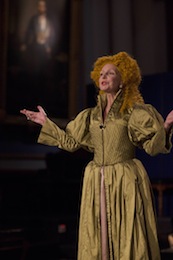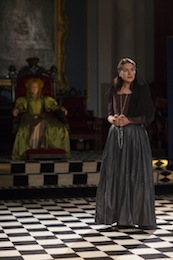England, Fotheringhay Castle, 1587. Mary Stuart (Christiane O’Mahony), deposed Catholic Queen of Scotland, has been in prison for 19 years under the rule of her cousin, Queen Elizabeth I of England (Aenne Barr). A series of Catholic plots to release her and overthrow the Protestant regime has threatened the stability and authority of Elizabeth’s realm, but her various advisors disagree on how to handle the situation. Lord Burleigh (Neill Fleming) urges execution. George Talbot (Pádraig Murray), Earl of Shrewsbury, urges moderation. Robert Dudley (Matthew Ralli), Earl of Leicester, sometime  suitor to both women, defers to the Queen’s majesty and beauty without making it altogether clear whether or not he even has a stand of his own. Meanwhile Mary languishes in isolation from her religion, receiving cold comfort in the efficient stewardship of Sir Amias Paulet (Karl O’Neill), who claims to despise Mary’s crimes, not her person, and his nephew Sir Edward Mortimer (Matthew O’Brien), who comes with some unexpected news of hope as the play gets underway.
suitor to both women, defers to the Queen’s majesty and beauty without making it altogether clear whether or not he even has a stand of his own. Meanwhile Mary languishes in isolation from her religion, receiving cold comfort in the efficient stewardship of Sir Amias Paulet (Karl O’Neill), who claims to despise Mary’s crimes, not her person, and his nephew Sir Edward Mortimer (Matthew O’Brien), who comes with some unexpected news of hope as the play gets underway.
This preface is necessary to understand the lay of the land in Schiller’s powerful and surprisingly modern treatise on the limits of liberty and the exercise of power at the highest levels. Though it is a ripping political thriller, as director Liam Halligan notes in the programme, it is also very clearly an ideological articulation. Though the Queens represent absolute power, neither is seen to truly wield it. Both are more pawns in a complex game of political chess played perhaps by a God presenting two aspects of his will across two religions, certainly by men of influence (dressed in modern suits) working partly in shadow between the light of two women (dressed in period costume).
Dispossessed and deposed, Mary still maintains her right to monarchical status, decrying the tribunal of ‘peers’ that have tried and found her guilty under slippery legal circumstances. Meanwhile Elizabeth walks through a minefield, uncertain whom to trust for guidance, and must weigh the necessity to be seen to have authority with the need to maintain political balance both internally and internationally. The French continue to press her to marry and unite the Thrones, but Elizabeth isn’t sure she can trust any man, let alone a French Royal she’s never seen. So, does she execute her own cousin, also a Queen, on the advice of men who may not share her interests, the mob, who may not share her religion and could as easily love Mary if fate placed her on the throne, or does she obey her own conscience? Which says what, exactly? Does she even have the authority to decide? On the chessboard-like patterned carpet floor of the Freemasons' Hall, surrounded by the stern faces of Irish Freemasonry, the production seems very much at home.
.jpg.aspx) Unfortunately, in other respects the production is not comfortable at all. The venue presents many difficulties that aren’t successfully overcome. The extraordinary surroundings do not lend themselves to subtle lighting, and Ciarán O’Melia can do very little but turn the main lights on and off with an audible ‘click’ and vainly throw some focused illumination from a few desultory and distant spotlights to bring hue and complexion to the action. Some scenes take place basically in low light, not even a moody candlelight. You find yourself merely squinting, not contemplating the ambiguity of the darkened corridors of power. Similarly, Halligan and his cast do not fully overcome the acoustic challenge of traverse staging on the flat floor. Some dialogue is lost no matter where you sit, and when the actors try to cross the massive space at speed to convey urgency, it begins to look a like a desperate rush to a mark. Even the floor gets its voice heard, including alarming creaking under the carpet in particular areas, and some resounding thudding during the awkwardly choreographed attempted rape scene late in the proceedings. The venue is, on paper, a great boon, but it gives with one hand and takes with the other, and the audience will need to decide for themselves what it leaves them with.
Unfortunately, in other respects the production is not comfortable at all. The venue presents many difficulties that aren’t successfully overcome. The extraordinary surroundings do not lend themselves to subtle lighting, and Ciarán O’Melia can do very little but turn the main lights on and off with an audible ‘click’ and vainly throw some focused illumination from a few desultory and distant spotlights to bring hue and complexion to the action. Some scenes take place basically in low light, not even a moody candlelight. You find yourself merely squinting, not contemplating the ambiguity of the darkened corridors of power. Similarly, Halligan and his cast do not fully overcome the acoustic challenge of traverse staging on the flat floor. Some dialogue is lost no matter where you sit, and when the actors try to cross the massive space at speed to convey urgency, it begins to look a like a desperate rush to a mark. Even the floor gets its voice heard, including alarming creaking under the carpet in particular areas, and some resounding thudding during the awkwardly choreographed attempted rape scene late in the proceedings. The venue is, on paper, a great boon, but it gives with one hand and takes with the other, and the audience will need to decide for themselves what it leaves them with.
The text requires the actors to deliver quite involved performances. It is an intricate unpacking of layers of deceit and political theatre on the human level. Every character has at least two faces, and many of them pursue secret agendas that require them to speak carefully and tentatively before showing which side they currently need. Witness the coy early encounter between Mortimer and Dudley in which both seek assurances from the other as to how they should speak and with what voice, or observe the modulation required of Elizabeth as she signs her cousin’s death warrant but refuses to give clear direction to the terrified clerk that takes possession of the document. Textually, it is a chilling and instructive lesson in politics and diplomacy. Theatrically, it needs a cast on top of its game proceeding w.jpg.aspx) ith clear direction. Again, this is not always as it should be. There are hesitations and uncertainties that have less to do with characterisation and more to do with simply handling the dialogue and blocking the action. There was some inappropriate laughter from the audience at times, and a degree of confusion from dropped lines that broke the spell more than once, and though your heart goes out to all concerned, this play is tricky enough to hang onto without these sorts of distractions. The same could be said of Rob Harrington’s rather silly French accent, which is more reminiscent of Monty Python than Schiller, and that really is a layer of intertextuality that the play doesn’t deserve, particularly not when Pierpaolo Vitale is seated at the Hall’s organ contributing some sonic ambiance from time to time, but also borders a little on a burlesque presence.
ith clear direction. Again, this is not always as it should be. There are hesitations and uncertainties that have less to do with characterisation and more to do with simply handling the dialogue and blocking the action. There was some inappropriate laughter from the audience at times, and a degree of confusion from dropped lines that broke the spell more than once, and though your heart goes out to all concerned, this play is tricky enough to hang onto without these sorts of distractions. The same could be said of Rob Harrington’s rather silly French accent, which is more reminiscent of Monty Python than Schiller, and that really is a layer of intertextuality that the play doesn’t deserve, particularly not when Pierpaolo Vitale is seated at the Hall’s organ contributing some sonic ambiance from time to time, but also borders a little on a burlesque presence.
Aenne Barr is good as Elizabeth. She conveys the combination of command and vulnerability required, and her domineering but lonely bearing greets the audience on arrival as she waits upon the throne, a position she also occupies at the final curtain. Schiller seems to have given Mary a somewhat pedestrian pious righteousness and robbed her of that vital second face every other major character has. In the few scenes where her mask begins to drop, allowing the Queen’s rage to surface, Christiane  O’Mahony doesn’t really project anything truly dangerous or powerful from this woman, but rather continues the solemnly pure presentation of a wronged soul the text seems to require. Matthew Ralli is a fairly effective Dudley, certainly when he plays the manipulating Casanova to both Queens. His final narration of Mary’s execution is not moving though, lacking a sense of genuine anguish. Likewise Matthew O’Brien does his best with Mortimer (a fictive and transparently didactic character), but again his final scenes – the rape attempt and his suicide – seem forced into spectacle, almost to the point of melodrama. Neill Fleming is an impressive Burleigh, laden with personal venom in spite of the surface appearance of devoted dutifulness, Karl O’Neill is a similarly stern but sympathetic Paulet, and Pádraig Murray is a believably humane Talbot.
O’Mahony doesn’t really project anything truly dangerous or powerful from this woman, but rather continues the solemnly pure presentation of a wronged soul the text seems to require. Matthew Ralli is a fairly effective Dudley, certainly when he plays the manipulating Casanova to both Queens. His final narration of Mary’s execution is not moving though, lacking a sense of genuine anguish. Likewise Matthew O’Brien does his best with Mortimer (a fictive and transparently didactic character), but again his final scenes – the rape attempt and his suicide – seem forced into spectacle, almost to the point of melodrama. Neill Fleming is an impressive Burleigh, laden with personal venom in spite of the surface appearance of devoted dutifulness, Karl O’Neill is a similarly stern but sympathetic Paulet, and Pádraig Murray is a believably humane Talbot.
This is a very powerful text and definitely worthy of a staging. It is fascinating how contemporary it really is, with no-nonsense dialogue and a great clarity in storytelling that belies its first presentation in 1800. Its gender-inflected meditations on the limits of freedom are both timely and dramatically effective. This independent, partly crowd-sourced production has its points of interest and has laudable ambition. The degree to which its awkward elements will prove unsurmountable from the point of view of audience engagement will measure its value to the individual patron.
Harvey O'Brien